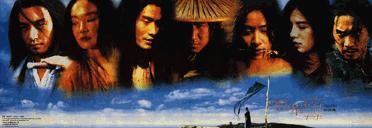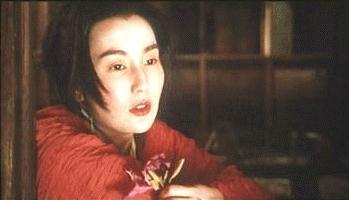![[safe]](safe.gif)

Ashes of Time

tony leung chiu wai, tony leung kar fai, bridget lin, carina lau,
jacky cheung, leslie cheung, charlie yeung, maggie cheung (unbilled cameo)
Directed by wong kar wai
![[safe]](safe.gif)


The "plot" loosely concerns a group of swordsmen and women, each with a bittersweet story to tell of innocence lost and love shattered. Indeed, by turning Louis Cha's classic gongfu novel "Evil East, Wicked West" [the second instalment in the celebrated author's "Legend of the Brave Archer" trilogy] into a tale of introspection and meaning, director/scripter Wong offended many of the original's hard-core fans who found his reinterpretation too subversive, post-modernist and downright strange to stomach. Worse still, those unfamiliar with Cha's original source novel were left to ponder many of the subtle revisions which were left unexplained in Wong's film.
The original plot actually dealt with two characters nicknamed "Evil East" and "Wicked West", aged, respected and feared demi-gods in the pugilistic world. Arch rivals, their tussle for power was the backdrop against which Cha's main protagonists (a pair of lovers from the entire trilogy series) were tested in terms of their wits, loyalty and love for one another.
In Wong's film, however, the hands of time have been turned back, and the focus is primarily on the two men, now portrayed in their prime, and seeks to "explain" the beginnings of their bitter feud in a progressive manner. Much like Tsui Hark's post-modernist and daring revisionist versions of Madam White Snake (Green Snake) and The Butterfly Lovers (The Lovers), Ashes of Time turns a well loved tale on its head and sets about giving it new meaning. But whilst Tsui Hark succeeded on the strength of injecting modern overtones and employing Japanese and Western cinema techniques to lend his tales a refreshing and at times controversial feel, Wong opts to de-construct the myth perpetuated by the source novel and seeks to simplify the story to its bare bones; in the process, he winds up with a tale of extreme complexity and a heavy air of heartache.
The style of the film itself does not lend it accessibility: employing a "circular" method of storytelling, Wong's film begins with the end, and ends with the beginning - everything in the middle constantly shifts through time and space, with the introduction of a cast of characters that are fragments of their personas as originally written in the novels, their existence merely Wong's method of exploring his favourite themes of unrequited love and timeless longing and misery. Such a technique means the viewer is required to invest much in order to get maximum returns, and this could be another reason why the film fared so dismally, since most film-goers in Hong Kong and Singapore are not known for being particularly patient nor thoughtful of what they see.
However, to be fair, Wong's film does tend to lumber on rather aimlessly at times. Scenes of Carina Lau cavorting with a horse in a glistening pool, or scenes featuring Bridget Lin writhing against the branches of a tree are puzzling and pretentious at best. The ending of the film also features a hefty collage of images not included in the film proper - an indication that Wong shot much more footage that he actually used. Depending on which version you see (either the Hong Kong print or the Taiwan print), you are left with the impression that there may be a sequel - Joey Wong even appears in one of the clips, although there is no sign of her whatsoever in the entire film! Such a conclusion is rather frustrating for there is no epilogue to explain them: the viewer is left to guess the significance of these images, a tall task for those unfamiliar with the source novel. Ashes of Time can be seen both as a failed ultra-art attempt at film-making, or a tentative experimental triumph, for ultimately, it is an absorbing piece of work.

Employing a linking device known as the "wine of dreams and amnesia", we are told of the individual and collective histories of this group of jianghuren (men and women of society). There's Evil East himself (played by a goateed Leslie Cheung), a man on a self-imposed exile in the dessert, selling professional hit man services, seeking to exorcise the memories of his ex-lover (the luminous Maggie Cheung in an unbilled cameo). There's Wicked West (the overrated Tony Leung Kar Fai), his best friend and annual visitor in his barren wasteland home: a man cursed with devilish charm which wins him the affections of two women, but whose heart belongs to another whom he can never attain. A virginal young girl (Charlie Yeung) with revenge on her mind and principles in her heart serves as a foil to Evil East's cold heartlessness. There's the unnamed Blind Swordsman (the soulful Tony Leung Chiu Wai) who tells a bitter tale of emotional and relational betrayal: his wife Peach Blossom (Carina Lau) loves his best friend Wicked West, who due to copious amounts of the "wine of dreams and amnesia" can no longer remember him. The witchy twins Murong Yan and Murong Yin (both played by a cross-dressing Bridget Lin), who are either incestuous siblings or one and the same person, are also besotted with Wicked West, and who, in bitter envy, drive themselves mad. Also central to the plot is Hong Qi (Heavenly King Jacky Cheung), an idealistic sword-for-hire who is at first seduced by, but later rejects, Evil East's moral ambivalence toward life and death as a hit man.
As apparent, the plot is nothing but a collection of character studies; each lives in misery and hopelessness even as the passing of time serves, not to erase their hurt, but to deepen the pain - like the "wine of dreams and amnesia", the more they drink of it, the more they remember rather than forget. To be so audacious as to reduce an exciting, fast-moving gongfu legend into a series of disjointed meanderings in the minds of the characters, Wong has taken a huge risk, and come up with a result that is partly satisfying, partly baffling.
Firstly, although Zhang Shuping won numerous awards for Costume Design, Set Decoration, Aesthetic Accomplishment, the fact that most of the film's appealing cast are made-up to look virtually identical was one reason why audiences unfamiliar with the individual actors themselves could not follow the plot without descending into confusion. That said, the film is still a sight to behold: barren sets and landscapes lend an added air of desolation to the on-goings, and the stark, untidy adornments the cast model mirror the internal turmoil their characters go through.
Also, as noted earlier, the circular narrative style employed means that events do not progress in chronological order; rather, related vignettes are timorously linked by long introspective narratives, which though absorbing to listen to, are not terribly clear in establishing a specific sense of time and place to the happenings on screen.
Lastly, Dou Kefeng's (Englishman Christopher Doyle's Mandarin name) cinematography, though lush, obscures much of Samo Hung's fight choreography. I personally enjoyed the film better this way, with its blurred images of chaos lending added pathos to the confusing fights that erupt, but the average action-flick fan would probably have found this frustrating - they forget this is first a drama, with swordplay incidental to its plot. The camera-work is perhaps one of the best Hong Kong cinema has to offer today.
On a positive note, the writing in the script is of an exceptional standard: little wonder that in spite of butchering Louis Cha's source novels, Wong still managed to pick up awards for his script. It is a meditative, sombre piece with heavy philosophical dialogue and musings which ponder life and love. Every sentence, every speech reads almost like poetry, and delights with its piercing insights and thoughtful views. Even with its "parallel reality" style which caused some confusion, it remains one of the best scripts from Hong Kong cinema in 1995.
The cast Wong has assembled are talented, but effective to varying degrees. Leslie Cheung plays his character's moral ambivalence and embittered heartlessness with a rakish charm that prompts one to empathise with the pathetic existence he lives in his lonely hovel in the dessert. Tony Leung Kar Fai's Wicked West is less effective; he lacks the requisite careless charm to make his "heart-breaker" character believable. The other Tony's Blind Swordsman is another feather to this actor's cap - though the role is small, the convincing manner he portrays it and his commanding screen presence makes it one of the most memorable in the gallery of characters. Charlie Yeung holds her own admirably well in the face of so many veterans, her youthful appeal lending credence to her role's virginal qualities. Carina Lau is wasted though; her character speaks all of two lines and spends much of her on-screen time looking ravishingly tousle-haired, petting a horse (don't ask) and doing not much else. Likewise Bridget Lin, whose stilted performance turns an otherwise intriguing and psychologically complex role into a two dimensional caricature.
But Wong's greatest casting triumph is Maggie Cheung, in her last screen role before disappearing from the entertainment scene for a year. As the woman at the centre of the tale - the one both Evil East and Wicked West love but cannot have - her subtlety and controlled pain shine. Wong wrote all the best lines for her, and she more than does them justice, lending an ethereal quality to her character even as she descends into misery and loneliness. Her ten minute monologue that closes the film will go down in Hong Kong film history - the static shot of her porcelain features slowly tearing as she delivers her lines will haunt you long after the film is over.
Wong returns to the terrain of his second film Days of Being Wild, exploring time and love in a romantic style. Many have argued that this film is nothing more than a reworking of that seminal work, with an almost identical cast reprising their roles in ancient garb. However, they overlook the multiple layers that lend this film a credence and weight all of its own. It is undoubtedly a more mature and deeper work, delving into the tormented psyches of its protagonists to expose and comment on our society. Wong's eye for detail and his lush execution of his own script make this one of the boldest, most challenging films to have emerged from Hong Kong's production line film factory for a long time. To those brave enough to challenge themselves cerebrally and culturally, this film more than satisfies.
There is hope yet for Hong Kong cinema.